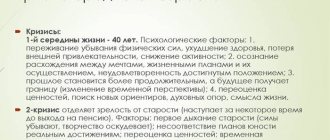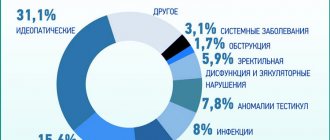Men are from Mars, women are from Venus - this expression, which was originally the title of a book, has long become popular. It perfectly characterizes the essence of one of the branches of psychology that studies the differences between men and women, which is called gender psychology. The spectrum of her study includes life perception, thinking, emotions and conflict resolution related to the psychological aspects of different genders. What are the main differences between male and female psychology?
Abilities, or who is smarter
Nobody. It is impossible to compare a man and a woman in terms of intelligence, since each sex is excellent in its own sphere and, accordingly, is superior to the opposite:
- Women have more developed abilities in reading, writing, languages, aesthetics, that is, humanitarian abilities.
- Men have more developed technical abilities in the field of exact sciences.
It is impossible to say what causes this pattern: natural influence or the result of stereotypical upbringing (boys are bought cars and literally forced to tinker with the equipment). But another fact definitely does not depend on upbringing: among men, geniuses and mentally retarded people are more common.
Psychological characteristics of men and women in situations of life crisis
The purpose of the study is to study the characteristics of the psychological manifestations of men and women during periods of life crises at a young age, periods of early adulthood and late adulthood. In the process of work, the parameters of vitality, activity, self-esteem in adults are examined, taking into account the gender aspect, as well as the manifestation of personal characteristics that influence the specifics of living through life crises. The article provides a comparative analysis of the main differences in the reactions of women and men to crises in different periods of life.
Key words: analytical psychology, psychological, research, experimental methodology, life crises, psychology of male behavior, psychology of female perception, gender characteristics, mental activity, psychological well-being, mental stability, life satisfaction, self-control, sociability.
The aim of the study is to study the peculiarities of psychological manifestations of men and women during life crises at a young age, early maturity and maturity. In the process of work the parameters of vitality, activity, self-esteem in adults, as well as the manifestation of personal characteristics that affect the specifics of living crises are being investigated. The article presents a comparative analysis of the main differences between the reaction of women and men to crises in different periods of life.
Keyword: analytical psychology, psychological, research, experimental methodology, life crises, psychology of male behavior, psychology of women's perceptions, gender differences, mental activity, psychological well-being, mental stability, life satisfaction, self-control, sociability.
The relevance of the study is due to the need to study the occurrence of psychological problems and the characteristics of their manifestation in different sexes in situations of life crises [5, p. 175]. For example, Ippolitova E. A. considers in her work methods for diagnosing crises, as well as psychotechnical techniques aimed at providing psychological assistance to a person experiencing a crisis [7, p. 96]. Bendas T.V. in his work “Gender Psychology” compares men and women on various manifestations of the psyche and behavior [2, p. 84]. In the work of Andronnikov, O.O. “Gender differentiation in psychology” provides information for the formation of professional competencies in the field of gender approach issues in practical activities and advisory practice [1, p. 114].
Crisis periods in a person’s life are a necessary stage in the formation of his internal sense of self and are necessary for reassessing values and changing one’s reaction to the environment. As a result, crises are usually associated with a certain age, when a person’s social roles change, and he must change the structure of his behavior and response to new life factors.
As Polivanova K.N. writes, “The main task of the crisis of 30 years is the search for the meaning of existence, which is associated with the transition from youth to maturity. This crisis is experienced most acutely due to the unrealization of life’s plans” [8, p. 98].
There is an opinion that the high social status and income of an individual is directly dependent on the inferiority complex he experiences. A person who has a positive assessment of his abilities and has the ability to control his own life is less dependent on the need to prove his worth with material benefits and high status.
With reduced self-esteem, a person is prone to depression, manifestations of psychosomatic diseases, and there may be a decrease in the effectiveness of professional activities, and therefore it is necessary for him to maintain a positive attitude during the period of maturity.
Both men and women tend to attach greater importance to the value of interaction than to such life parameters as the organization of life activities. Here the qualities of the individual himself come to the fore and are associated with the manifestation of these qualities in the environment. A significant difference between the significance of values among men and women is observed in the implementation of their activities.
For men, what is important for self-esteem is the quantity and quality of achievements in different areas of life, primarily professional. For women, raising children and family relationships play an important role. The difference in this choice determines, to one degree or another, the perception of prospects for men and women.
An individual’s attitude towards spiritual and material goods that satisfy his basic needs is called value orientations. In adulthood, people develop a clearer perception of their own rights and responsibilities through family or social roles. In this case, the set of values of each individual will determine the main priority roles or social standards included in the personal list of rights and responsibilities of a person.
It is known that with age one can observe changes in the manifestation of sexual activity in men and women. For men, the fear of loss of sexual attractiveness is typical after 40 years of age, which is most often associated with ignorance of the existing state of affairs in this direction. It can be stated that the less a person’s external attractiveness, the higher the sexual activity may be, which is associated with the need for psychological compensation.
V.V. Bocharov writes that among men, social and age experiences are often associated with the age of the women with whom they are in sexual relationships. Men with high social status more often than those from other social groups prefer to marry younger women [4, p. 115].
When assessing physical attractiveness, it was revealed that women with low social status tend to underestimate their figure, while women with high social status tend to overestimate their attractiveness. During adulthood, the presence of anxiety in women usually does not affect their well-being and mood.
Young men may experience a decrease in mood, activity and well-being, with a high level of internal anxiety. In middle age, 30–35 years, men are less affected by anxiety than at a young age. At this time, anxiety can have a greater impact on your well-being.
An increase in the activity parameter in men in adulthood is associated with an increase in anxiety. During this period, a stable state of mind is developed in relation to threats from the outside world. The most difficult period in life for men is retirement. This is due to the fact that it is important for a man to be active and he most often associates his importance with achievements in the professional field; for him this can be the meaning of life.
For women, to a certain extent, retirement age is also a crisis, but it is not so pronounced, since a woman more closely connects her personal successes and achievements with family values. According to Kudryavtsev V.T., “The advantage of a woman is that she can overcome her crises by “immersing herself in the family”, taking care of its preservation and strengthening” [6]. In general, a woman’s experience of a crisis in adulthood can be much easier than a man’s, especially if the woman is realized as a mother and wife.
Bolotova A.K. in her book “Developmental Psychology” studies people’s abilities to cope with crisis situations at different ages, from childhood to adulthood. She explores issues related to people's satisfaction with retirement. She writes that “women are somewhat more likely to be satisfied with retirement than men (66% versus 61%)” [3, p. 208].
During youth, women can observe high rates of functional states, in contrast to the crisis stages of life during adulthood and middle age. It can be stated that during youth and maturity, women are more prone to both a decrease in their functional state and a deterioration in mood when experiencing crises. Such conditions can significantly affect women's self-esteem during critical periods of life. During the period of maturity, women's general resistance to anxiety increases, which does not affect functional indicators of life.
Most men are more productive at an early age, up to 25 years old. Increased anxiety in men can be a critical moment at a young age, as it negatively affects his mood, activity and well-being. But during the crisis of 30 years, stability in relation to well-being increases, and in middle age, men experience an increase in activity, while the general level of well-being falls. To overcome anxiety, men may increase their activity levels in adulthood, resulting in increased physical and mental health risks.
The manifestation of creative potential and intellectual abilities in a man’s life can be a factor that helps in overcoming periods of crisis at different times of life, including crisis periods.
Indicators of achieving goals for men almost always have a significant impact on the level of life satisfaction. At a young age and in late adulthood, a positive assessment of oneself is relevant; during the crisis of 30 years, the presence of interest in life and the emotional component play a big role.
In women under the age of 25, a positive relationship can be observed between daydreaming and thinking about the future. The higher the practicality of a woman, the higher the reflection aimed at real activity. An important component for women in their youth is thinking about events that happened in the past and extracting the necessary experience. This ability affects calm and balance of character.
Women, who tend to occupy a more subordinate position in society, prefer to cope with crises, trying to look into the future, rather than analyzing and changing the present. At the same time, an inverse relationship is also observed: women who are prone to dominance try more to act in the present, finding solutions to problems “here and now,” and not look far into the future. The lower the understanding of the world, the more often women use past experience, trying to find an explanation for current events.
There is a close connection between the level of sociability in young women and their understanding of the processes taking place in life. A focus on seeking interaction with others, sociability, the ability to create comfortable communication and express oneself in it directly affects a woman’s ability to endure periods of crisis at different ages. This process is more pronounced in the period after 30 years.
In women, sociability with other people to a certain extent depends on internal attitudes, in particular, the manifestation of diplomacy.
To summarize, we can state that the most favorable period for men in terms of the combination of functional states is the age from 35 to 45 years. Approximately the same age is optimal for overcoming the crisis for women. In women, vitality parameters increase towards midlife, while in men this indicator gradually decreases.
In order to develop and overcome crisis periods in life, both women and men need to learn to overcome crisis situations. This is also due to a person’s understanding of the periods he is living through and the ability to focus on the positive aspects of solving problem situations, which help to move to a higher level of awareness in general.
Literature:
- Andronnikova, O. O. Gender differentiation in psychology: textbook / Moscow: University textbook: Infra-M, 2021. - 262 p.
- Bendas T.V. Gender psychology. St. Petersburg Publishing House: Peter, 4th edition. 2006. 196 p.
- Bolotova A.K. Developmental psychology. M. CheRo, 2005. 524 p.
- Bocharov V.V. Anthropology of age. Tutorial. - St. Petersburg: St. Petersburg University Publishing House, 2001. - 194 p.
- Vasilyuk, F. E. Psychology of experience / F. E. Vasilyuk. - M.: MSU, 1984. - 240 p.
- Kudryavtsev V. T. Age crises in men and women. https://tovievich.ru/news/1422-vozrastnie-krizisi-u-muzhchin-i-zhenshchin.html.
- Ippolitova E. A. Psychological assistance to a person experiencing a crisis. Tutorial. Barnaul, Publishing house Al. Univ., 2014. 114 p.
- Polivanova K. N. Psychology of age-related crises. Textbook for higher education students. establishments. M.2000. 184 p.
The work of the hemispheres
Not only are the right and left hemispheres of all people not equally developed, but there is an additional difference between men and women: women use two hemispheres at once, men use only one. This is why it is more difficult for men to combine analysis and emotions. This also makes women talk faster and more emotionally. But men are better at spatial orientation.
All behavior of men and women depends on the characteristics of the hemispheres:
- Men need time to switch from feelings to rationality and vice versa.
- Women constantly balance between emotions and reason, while men are guided by one or the other.
Dictionary
We are so different that a dictionary was even created to better understand each other. It will be especially useful for men.
From female to male
- Yes = No
- No = Yes
- Maybe = No
- We need = I want
- Great! = Shut up!
- Don't talk to me anymore = Apologize
- Sorry = You'll regret it
- Yes, as you wish! = Fuck off!
- Five minutes = Sit down, relax, have a beer
- We need to talk = I want to complain about you
- What? = You better not repeat what you just said
- Of course, continue = Better stop
- Do what you want = You'll pay for it
- I wasn't upset = Of course I was upset, idiot!
- You need to learn how to talk to people = Just agree with me
- I'm not angry = You're dead
- Yes, forget it = Remember and better compensate me for this somehow
- I'm tired = Boy, you've already missed your chance
- I went to the restroom = I'm going to redo my makeup
- I'm not crazy. And I'm not mad = I'm on my period
- Leave me alone = Don't go
- She looks so good = I want her dress
- You're so manly = You need to shave
- I am fat? = Tell me I'm beautiful
- I'm cold = Take a blanket and hug me
- I love you = Tell me that you love me more
From male to female
- Yes = Yes
- No = No
- Maybe = Yes
- I'm hungry = I'm hungry
- I'm tired = I'm tired
- I want to sleep = I want to sleep
- I love you = I like you, I guess, well... maybe I'm confusing something. No matter what, I love you.
- Nice dress = Deep neckline (or you look great)
- I liked it better = Yes, just buy a dress and let’s get out of here
- Yes, I like the way you cut your hair = Yes, I didn’t realize that you cut your hair
- Yes, everything is fine, don’t rush = For God’s sake, hurry up
- I'm bored = Do you want to have sex?
- What's happened? = What kind of senseless, useless suffering are you having again?
We are very different, but we should not be like each other. A man is a perfect person, but in order for him to become a man, he needs a woman.
PS Here are a few facts about men and women that you might have missed in our Facebook feed.
Adaptation
The ability to adapt is directly related to the characteristics of the nervous system. It is known that all people differ in temperament (type of nervous system), but it is also known that women have a more flexible and less stable psyche (transitions from one emotional state to another occur in a matter of seconds) than men. It is this fact that allows us to talk about better adaptation abilities in women.
Perception
Of all types of perception, men have the best developed visual. Women perceive better by ear. Yes, yes, men really love with their eyes, and women love with their ears.
As for color perception, it develops earlier in women. In addition, women can see more shades. Women's perceptions are generally more flexible than men's.
Assessment and self-esteem
Women are more likely to suffer from low self-esteem and dissatisfaction with themselves. When it comes to evaluating other people, women evaluate men more adequately than women. This is quite understandable. After all, every woman is a potential rival. If a conflict arises between two women, then the battle will be life and death. It has long been proven that in wrestling women are much more cynical, tougher, more aggressive and calculating than men.
Men are more tolerant and forgiving of women's shortcomings, perhaps because they always consider themselves a little better and stronger. Women in general are more prone to judgment, discussion and condemnation.
Two more patterns are also interesting:
- Men rate women's business qualities lower than they expect. Women rate physical strength lower than men expect.
- But in terms of appearance, women are more lenient towards men, which cannot be said about men’s perception of women’s appearance.
Communication
Men pay attention to arguments. In communication, they are laconic and unemotional. Women tend to be distracted from the essence of the conversation, using emotions or intonation instead of arguments.
Men are prone to discussions and consideration of different positions. They do not perceive any difference of opinion as a quarrel. For women it’s the opposite. Because of this and the psychological tendency of men to weakly recognize intonations, women’s grievances often arise.
Concrete versus abstract
Men's thinking is aimed at solving specific problems, and abstract concepts like “how do you feel” are of little interest to them. They do not understand hesitation and reflection if the way out of the situation lies on the surface (take it and do it). Women literally drown in their emotions and can think about solutions several times, which is why they can go down the wrong path.
Example : a wife talks about a problem, and the husband begins to get angry. Typically, women who talk about their problems do not expect advice, but sympathy and compassion. For men, this concept is too abstract, so in every similar situation they see a veiled request for help. If it is impossible to help through action, representatives of the stronger sex begin to feel their inadequacy, which results in discontent and aggression.
Multitasking
It is impossible to judge this clearly. So, on the one hand, men cannot combine two different things if one requires emotional costs and the other analytical. But on the other hand, the ability to multitask is a mandatory requirement for a modern specialist.
However, psychology notes that women find it easier to multitask. Another question is that it is unlikely that it will be possible to study them equally qualitatively and in depth. And more often we are talking about everyday affairs, which, as a rule, are brought to the point of automation. Women are not so much prone to multitasking as they often have to combine several activities and areas, for example, family and work.
In conclusion, I want to make a reservation that the article was about the average man and woman. Of course, there may be unique exceptions that prove the rules.
On a mental level
- Women can do two things at the same time (for example, watch TV and talk). Men only do one thing. Scientists believe that women are capable of this due to more efficient functioning of both hemispheres of the brain.
- A woman, being in the same room with another person, cannot remain silent for more than 20 minutes. A man in the company of another man can simply go about his business without saying a word.
- A woman immediately notices when her partner begins to be jealous. A man almost always does not see this until she tells him in plain text.
- During a quarrel, a man is usually more silent, and a woman expresses her emotions more.
- Women start crying very easily and do not feel anything shameful about it. It is much more difficult to make men cry and they prefer to cry alone.
- Men are not inclined to chase the same thought aimlessly. They determine whether the problem can be solved and decide... or not, but then they don’t think about it anymore. Women often cannot even sleep, over and over again thinking about the word someone said.
- Women express their love with words, and men with deeds.
- Women understand much better than men what other people feel (scientists believe that they have a kind of instinct that is developed in order to understand a child while he is not yet able to speak).
- Because women are more sensitive, it is easier to persuade them to make some kind of negative decision for themselves.
- Women know how to listen. Men - no.
- Women look weak but are strong in nature. Men, on the contrary, look strong, but are often weak by nature (this is noticeable in life expectancy and suicide rates).
- When a woman is in love, she thinks about the object of her adoration 24/7. It's not like that for men. They think about work, and about friends, and about family, and about their beloved.
- For women, sex is closely associated with emotions. For men, this is purely physical pleasure.
- Women are attracted to status, and men are attracted to youth and beauty.
- Women live either in the past or in the future. Men live in the present.
- Men are much simpler creatures than women.











